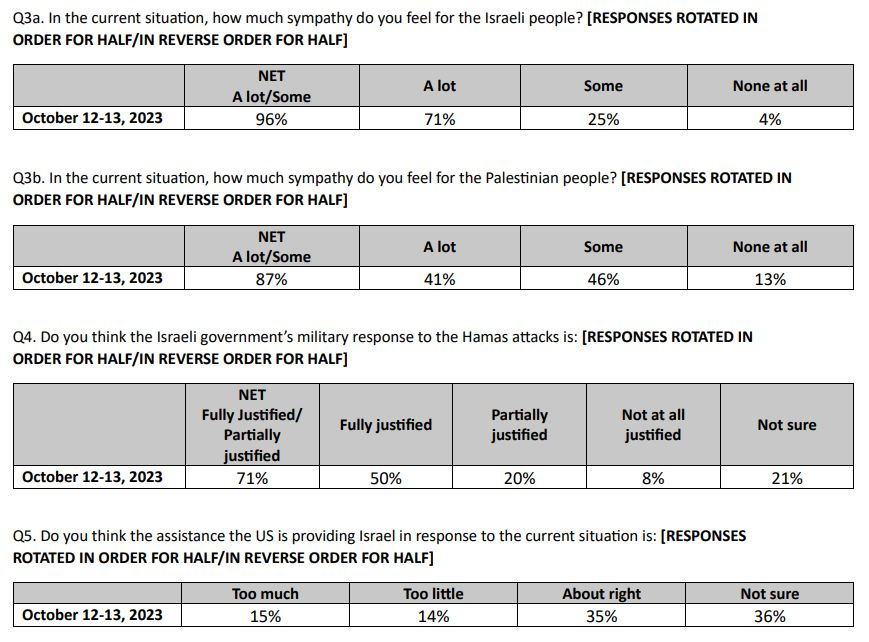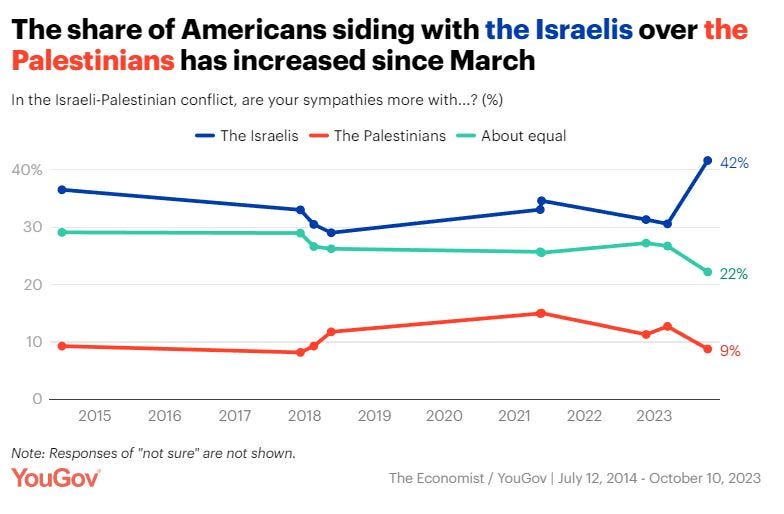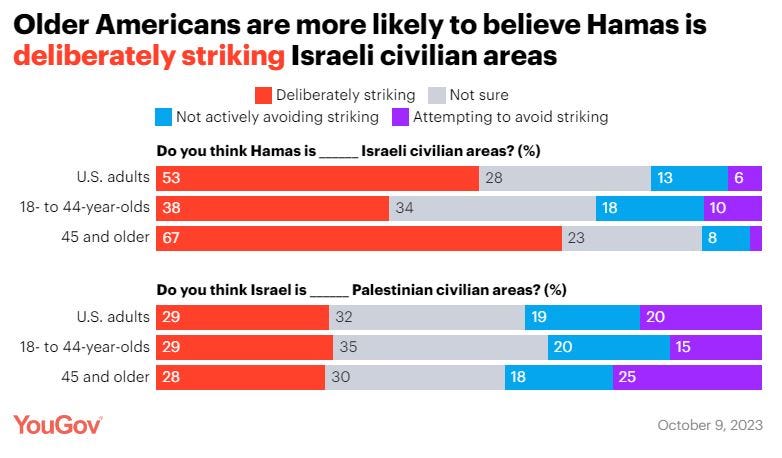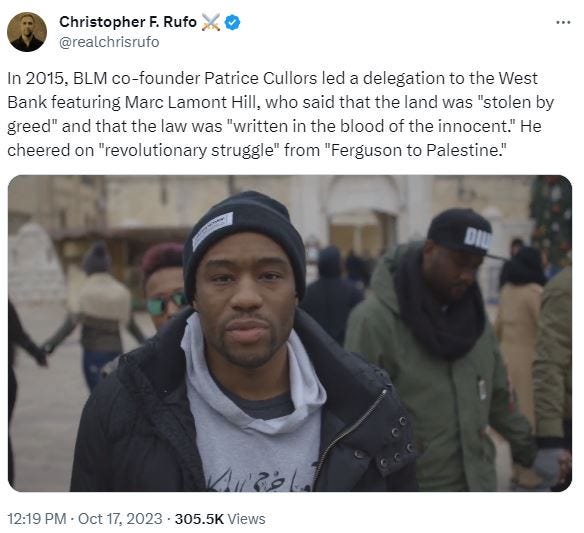Notes on the Israel-Hamas War
How Americans feel about Israelis and Palestinians, what the conflict abroad is doing to politics at home, and more.
Editor’s Note: Apologies for going AWOL on Friday. It was my birthday.
On Oct. 7, a terrorist attack launched by Hamas from Gaza left 1,400 Israelis—mainly civilians—dead. The world caught fire in the hours and days that followed.
Demonstrators across the West hailed the killers as liberators, bathing streets in the red, green, white, and black colors of the Palestinian flag. In Belgium, a gunman murdered two Swedish nationals in an attack that officials suspect is linked to the Israel-Hamas war. The State Department advised Americans to not travel to Lebanon after protestors set the U.S. embassy in Beirut on fire. On the other side of the world near Chicago, a six-year-old Palestinian-American boy was fatally stabbed to death by a deranged man. His mother said the suspect told her he was “angry at her for what was going on in Jerusalem” before he killed her son, who had just days earlier celebrated his birthday.
Although Americans remain united in their support for the Israeli cause, sympathy for Palestinians, and fears of a broader war, the conflict is rocking the cultural and political landscape in the U.S.
A CNN poll conducted Oct. 12-13 shows that Americans overwhelmingly agree with Israel’s military response so far. Similarly, a Quinnipiac poll of registered voters conducted Oct. 12-16 found that 76 percent of respondents think supporting Israel is in the national interest of the U.S.
Most respondents in the CNN poll said Israel’s reaction is justified (50 percent) or partially justified (20 percent). A total of 21 percent said they weren’t sure, while 8 percent said it is not justified at all. The majority of respondents also feel a lot or some sympathy for Palestinians. But their sympathy for Israelis is deeper.
Quinnipiac found essentially the same thing, with the majority of respondents (72 percent) blaming the outbreak of violence on Hamas and most (61 percent) saying they sympathize with the Israeli side more. Notably: “This is an all-time high of voters saying their sympathies lie more with the Israelis since the Quinnipiac University Poll first asked this question of registered voters in December 2001.”
Regarding U.S. assistance, 35 percent of Americans surveyed by CNN say we are providing just enough, while 15 percent say we’re providing too much, compared to 14 percent who say we’re providing too little.
Much of this isn’t too surprising if you look at historical trends.
Last March, Gallup found:
Americans sympathize more with Israelis than Palestinians, 55 percent to 26 percent.
26 percent who sympathize with Palestinians is new high in a 20-year trend.
Democrats’ sympathies are now divided but they still feel favorably toward Israel.
The percentage of adults with no preference—favoring both countries, favoring neither, or who are not sure—is now 18 percent, but was higher before 2017.
Most Republicans and Democrats view Israel favorably, although support is higher among Republicans.
While the sympathy gap has narrowed, independent voters also lean toward the Israeli side, 54 percent to 26 percent.
Support also varies markedly by age.
Gallup found that whereas most adults 55 and older (64 percent) and aged 35 to 54 (57 percent) are more sympathetic toward Israel, that number drops to 40 percent among those under 35; meanwhile, as many younger adults are more sympathetic toward Palestinians (37 percent).
Quinnipiac also found that age is a significant factor when it comes to support for providing Israel with military aid:
Voters 18-34 years old disapprove (51-39 percent) of the United States sending weapons and military equipment to Israel in response to the Hamas terrorist attack, while voters 35-49 years old (59-35 percent), voters 50-64 years old (77-17 percent), and voters 65 years of age and over (78-15 percent) approve.
Economist/YouGov polling shows the same general trends regarding age but also finds that American support for Israel has increased in the last few months.
More Americans in general and older Americans in particular believe Hamas is likelier than the Israeli forces to deliberately strike civilians.
Just 10 percent say the Israeli side is more to blame for the violence, compared to 39 percent of Americans who say the Palestinian side bears the brunt of the blame.
According to YouGov, in the past five months, “the share of Americans who strongly or somewhat support the U.S. giving aid to Israel has increased by 9 points, to 53 percent from 44 percent.”
Meanwhile, support for providing aid to Palestinians has fallen 10 points, to 21 percent from 31 percent.
In May, Democrats were less likely to favor U.S. aid to Israel than to Palestinians, but a shift occurred, and now 46 percent support aid to the former and 36 percent to the latter.
An ABC News analysis published Oct. 11 maps these historical trends along party lines.
In 2001, 59 percent of Republicans told Gallup they were more sympathetic to the Israeli side. That number jumped to 78 percent in 2023, while 63 percent of independents said in March they also had a very or mostly favorable view of Israel.
In January, more Democrats said they sympathized with Palestinians over Israelis (49 percent to 38 percent), but 56 percent still said they had a favorable view of Israel in March.
These trends seem to be driven by the growing influence of evangelicals in the GOP, on the one hand, and the rise of support for movements like Black Lives Matter among Democrats, on the other hand. Our political disagreements are really theological ones wearing masks.
That brings us to shifts in the domestic cultural and political landscape.
I have no idea if it will be permanent or if it is just part of the present mania. Some of this might sound ironic considering the controversies I’ve been the main character of recently. But it warrants an examination I have not seen anywhere else yet, and I think I can analyze the situation better than most people.
Here’s the picture: parts of the right-wing are currently aligned with the left-wing which has aligned itself with movements like Black Lives Matter. The single, tenuous thread in this intersectionality is enmity toward Jews or Israel or both. That is not something I say frivolously. I am being very precise with my language. I do not believe criticizing the government of Israel is tantamount to animosity toward Jews, but the coalition that I am describing is based to varying degrees on these sentiments.
That is why some pro-Trump right-wingers are siding with Palestinians against Israelis (even though Trump himself is decisively pro-Israel, which I’ll get into soon). It has little to nothing to do with genuine sympathy. I get sympathy. My stomach turns at images and videos coming out of this conflict. That is why I think the Republican chest-beating à la Lindsey Graham is inappropriate and counterproductive. In fact, it’s inhumane and ghoulish.
For these right-wingers, though, the faux sympathy is part of a game they’re playing that they believe is clever. In reality, it highlights how the right is short-sighted and reactive.
The people they’re nodding to took to the streets in a show of solidarity immediately following a terrorist attack and hailed the rising tide of “decolonization,” which means persecuting those designated as “colonizers,” all over the world, “from Ferguson to Palestine.”











